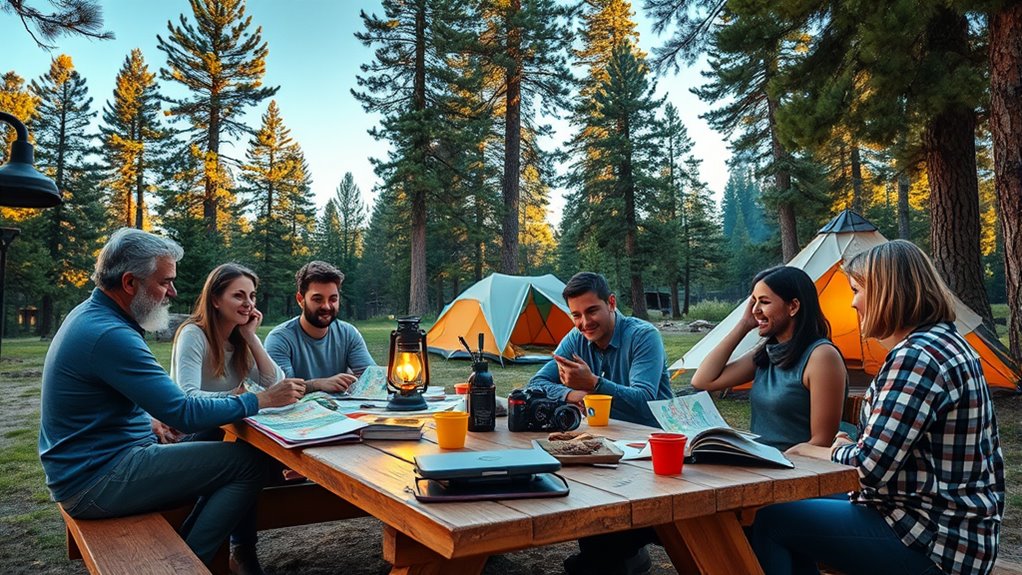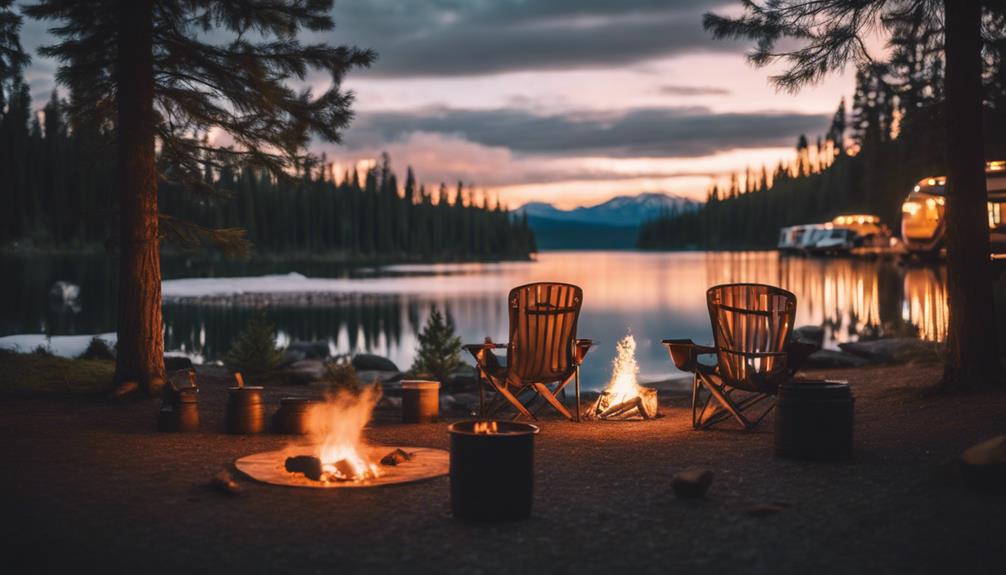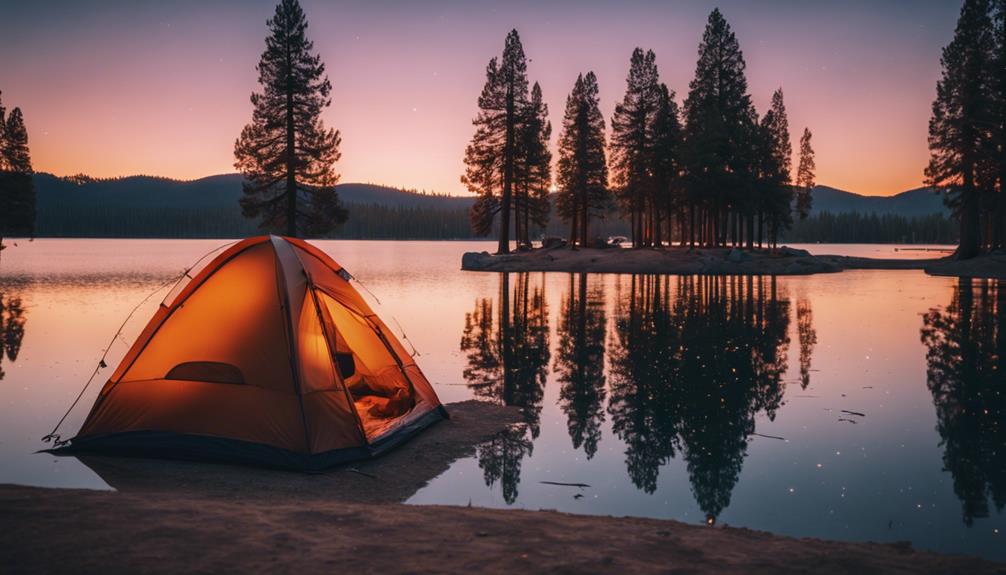To organize a successful group camping trip, start by selecting a suitable site that fits your group size, with proper facilities and easy access. Plan a balanced itinerary with activities, downtime, and meals, and assign clear roles for safety, gear, and food prep. Establish safety protocols, campfire rules, and etiquette early, ensuring everyone understands their responsibilities. Maintaining open communication fosters teamwork and respect. If you want to learn more about detailed planning, safety, and tips for a memorable adventure, keep exploring this guide.
Key Takeaways
- Select a suitable campsite considering group size, facilities, and accessibility.
- Create a balanced itinerary including activities, downtime, and meals.
- Assign roles for food prep, safety, and gear management, and communicate responsibilities clearly.
- Establish safety protocols and campsite etiquette to ensure a respectful environment.
- Prepare for emergencies and potential issues with proactive planning and open group communication.

Are you ready to organize a successful group camping trip? Planning for multiple people requires attention to detail and clear communication to guarantee everyone enjoys the experience. Start by selecting a campsite that can comfortably accommodate your group, considering factors like space, facilities, and accessibility. Once you’ve chosen the location, create a detailed itinerary that balances activities, downtime, and meal planning. It’s essential to assign roles—someone can handle food prep, another can oversee safety, and others can manage gear. This division helps streamline the process and prevents confusion during the trip.
One of the most important aspects of group camping is guaranteeing everyone understands key safety protocols, especially around campfires. Campfire safety isn’t just about lighting a fire; it’s about respecting boundaries, controlling flames, and extinguishing fires properly. Make sure everyone knows to keep a safe distance from the fire, never leave it unattended, and have water or a fire extinguisher nearby. Teach your group how to build a campfire responsibly—using a clear, designated fire ring and avoiding flammable materials nearby. When it’s time to put out the fire, guarantee it’s completely extinguished by dousing it thoroughly with water and stirring the ashes. This not only prevents wildfires but also reinforces a culture of safety and respect for the environment.
Campsite etiquette is equally essential for maintaining good relationships with fellow campers and preserving the natural setting. Encourage your group to keep noise levels reasonable, especially during early mornings and late evenings, and to respect quiet hours if the campground enforces them. Keep your campsite clean by packing out all trash, leftover food, and personal belongings, and avoid damaging plants or disturbing wildlife. Respect other campers’ privacy by maintaining a considerate distance and being mindful of shared spaces like restrooms and water sources. Reminding everyone of these rules helps foster a positive atmosphere and guarantees everyone has a comfortable experience. Additionally, understanding the importance of email marketing can be used as an analogy for clear communication—just as targeted emails improve engagement, clear signals and shared expectations improve group cohesion.
Effective communication before and during the trip is key. Discuss expectations around campfire safety, campsite etiquette, and group responsibilities upfront. Having clear guidelines minimizes misunderstandings and guarantees everyone is on the same page. Encourage open dialogue so that issues can be addressed promptly, whether it’s about fire safety, noise, or shared responsibilities. By paying attention to these details, you set the foundation for a safe, respectful, and memorable group camping adventure that everyone will look forward to repeating.
Frequently Asked Questions
How Do I Handle Conflicting Preferences Within the Group?
To handle conflicting preferences within your group, prioritize group consensus by openly discussing everyone’s ideas and concerns. Actively listen to each person’s perspective, and encourage respectful conflict resolution to find common ground. You might consider compromises or taking votes to ensure fairness. Keep communication transparent and organized, making sure everyone feels heard. This approach fosters cooperation, reduces tension, and helps plan a trip that everyone can enjoy.
What Are the Best Ways to Divide Camping Costs Fairly?
Think of your trip as a shared campfire, where everyone contributes to keep it burning brightly. Use clear cost sharing strategies like splitting expenses evenly or proportionally based on usage to guarantee fairness. Employ expense tracking methods such as a shared app or spreadsheet to document costs transparently. This approach keeps everyone accountable and fosters trust, making your group camping experience enjoyable and stress-free.
How Can I Ensure Safety for All Group Members?
To guarantee group safety, you should conduct a safety briefing covering emergency preparedness, including local emergency contacts and evacuation plans. Assign roles like first aid responder and establish clear communication methods such as walkie-talkies. Regularly check weather conditions, keep a well-stocked first aid kit, and make certain everyone knows basic safety procedures. By staying organized and proactive, you create a secure environment where all group members feel protected and prepared for any situation.
What Are Some Activities Suitable for Large Groups?
You can organize fun activities like group games such as tug-of-war, relay races, or scavenger hunts to keep everyone engaged. Outdoor cooking sessions also work well, allowing everyone to participate in preparing meals or snacks together. These activities promote teamwork, guarantee everyone’s involved, and create memorable experiences. Make sure to plan clear rules for games and safety precautions for outdoor cooking, so all group members enjoy safely.
How Do I Manage Last-Minute Changes or Cancellations?
Think of last-minute changes as shifting weather—prepare for surprises. Stay flexible by reviewing weather considerations daily, and keep your gear checklist updated. Communicate promptly with your group about cancellations, offering alternative plans or rescheduling options. Confirm reservations and transportation details, and adapt on the fly. Staying organized and proactive helps you navigate unexpected twists smoothly, ensuring everyone stays safe and the trip remains enjoyable despite disruptions.
Conclusion
Ultimately, successful group camping depends on clear communication, detailed planning, and shared responsibilities. When everyone contributes, the experience becomes more enjoyable and memorable, like a well-orchestrated symphony. Remember, small inconveniences are just gentle reminders that teamwork transforms challenges into opportunities for growth. Embrace flexibility and cooperation, as these subtle nuances often lead to the most rewarding adventures. With thoughtful organization, your trip will flow smoothly, creating cherished memories for everyone involved.










